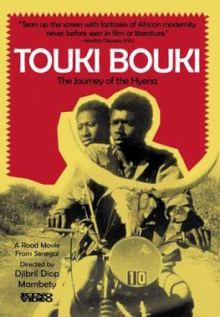This is only the second Senegalese film to be featured here but it’s an old one, contemporaneous with the French New Wave in fact and so shows its influence. However it’s also distinctly African in its sensibilities which at times can make it difficult to decipher. Confusing as it is sometimes, I’m very pleased that it actually does have a plot and even if I can’t understand everything, I found the parts that I could understand absolutely hilarious and entertaining. At the same time, it offers a very satisfying portrait of what Senegal was like in that era, from the poorest to the very richest echelons of society. Just a fantastic film all around.
Anta is a female university student who lives in the slums of Dakar. However she disdains her studies and her fellow students who seem to be bullies in favor of her boyfriend Mory. Mory is a penniless cowherd but he does own a motorcycle that is ostentatiously decorated with the skull of a bull, complete with large horns. The two dream of running away from Senegal to Paris, which looms large in their imagination as heaven on Earth. To do this, they need money and Mory proposes all kinds of outlandish, risky and illegal schemes. These include betting on a street con game and running away when he doesn’t actually have the money to cover the bet and robbing the money collected at a wrestling event. He finally succeeds when he goes to the seaside house of a rich friend. He turns out to be gay and tried to entice Mory into having sex. Mory steals fancy clothing, cash and even his car that is decorated with an American theme. Together Mory and Anta return to their neighborhood in glory and prepare to set off for France.
The film open with an extremely gory and daunting scene of cattle being led to slaughter. However absurd and funny some of the later scenes get, director Djibril Diop Mambéty is insistent that we never forget the poverty, desperation and stark inequality that drives the actions of the characters. The slums shown here are poor indeed, as the residents live in shacks next to unpaved dirt streets, where women must carry pails of water on top of their heads to meet their daily needs and haggle over small plates of vegetables in the market. It’s fascinating then that the film takes you up the tiers of wealth as it goes along, to the well-dressed crowd at the ritual wrestling event, to the rich man with his villa and at the very top end the white expatriates who disparage Senegal with every word and gesture. The scene which shows the duo cruising the streets in their stolen open-topped car is glorious, a delightful parody of how African dictators enjoy being feted by the crowds. It’s a perfect example of how the film incorporates African themes into the spontaneous realism of the French New Wave.
As always, there are elements I don’t quite get like what’s up with the person on top of the tree who gets hold of Mory’s motorcycle? I don’t know what’s going on between Mory and the male university students either. It’s unfortunate that it sees fit to make the predatory rich homosexual man as the subject of a joke but that’s about par for the course for the era. Everything else feels about right to me from my brief experience of Africa and it can be eye-opening how most of the country can be so poor and this tiny slice of it feels like a piece of Europe. The film looks great too, making good use of the color of their clothing and playfully messes the expectations of the audience with deceptive camera angles. It forces you to constantly think and reevaluate what it is you’re watching instead of comfortably settling into a familiar pattern.
I haven’t watched many films from African countries but those that are notable enough on the international scene have all been excellent. It especially blows my mind that this was contemporaneous with the French New Wave and so Mambéty deserves to be counted among their number. Highly recommended.
